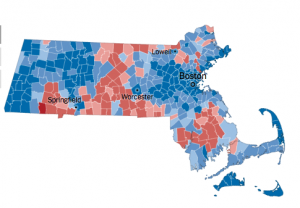
Guest post by Cathy Stanton, resident of North-central Massachusetts
 Even here in the bluest of states, there were splotches of red in the 2016 election, and our store is in a town in one of those splotches. This week, voters resoundingly defeated a tax override that would have kept town functions going at their already-less-than-minimal level. Now we’re looking at further cuts in services, including to the deeply stressed school system.
Even here in the bluest of states, there were splotches of red in the 2016 election, and our store is in a town in one of those splotches. This week, voters resoundingly defeated a tax override that would have kept town functions going at their already-less-than-minimal level. Now we’re looking at further cuts in services, including to the deeply stressed school system.
Here in the deindustrialized midriff of Massachusetts, a lot of people are still having a hard time accepting that the kind of prosperity that once existed in places like this is moving farther and farther out of reach. I often have a sense of America pulling itself apart here, as elsewhere, with a palpable blaming of public officials and impatience with the whole idea of government. You can see it on social media when people are toking up with a quick hit of indignation or wishful thinking, even in a town so small that it’s hard not to have some personal acquaintance who’s actually doing the hard, thankless work of serving on a town board or committee.
Meanwhile, our co-op’s board of directors is about to adopt a strategic plan for the coming year that includes downplaying our explicit messaging about being a democratically-owned and controlled grocery store. Paradoxically, our signage insisting “we’re for everyone” and “you don’t have to be a member to shop here” seems to convey exactly the opposite meaning, and we can’t afford to alienate or confuse potential shoppers, because we’re already functioning at a less-than-minimal level too.
When the override went down in flames, I had a moment of wondering if we were headed in the wrong direction. Isn’t this the very time to be shouting from the rooftops that all of us need to be honing our skills at democratic self-governance? Couldn’t our little store be serving as a useful microcosm of how collective action is almost always messy, imperfect, and often contentious, but also occasionally glorious and always so much better than feeling powerless and cut off from the structures of decision-making in our own lives?
 But to defend those principles more vocally, we have to be here in the first place, and that means broadening our customer base and our support in the community. So just as I’ve come to accept that I can’t lead off right away with a trenchant discussion about the complexities of food pricing, I’m think I’m fine with just walking our talk on the governance thing rather than spending more time trying to explain it to people.
But to defend those principles more vocally, we have to be here in the first place, and that means broadening our customer base and our support in the community. So just as I’ve come to accept that I can’t lead off right away with a trenchant discussion about the complexities of food pricing, I’m think I’m fine with just walking our talk on the governance thing rather than spending more time trying to explain it to people.
The first task is just to do it, and in the present moment I’m frankly grateful to have a place to be doing it, with people of good will and a shared sense of purpose. Our store and our town are microcosms of much larger struggles and breakdowns all around us, and if we’re going to have any hope of coming through them alive, this is something we’re all going to have to get a lot better at.



